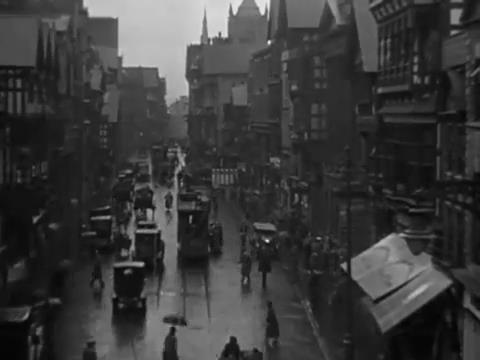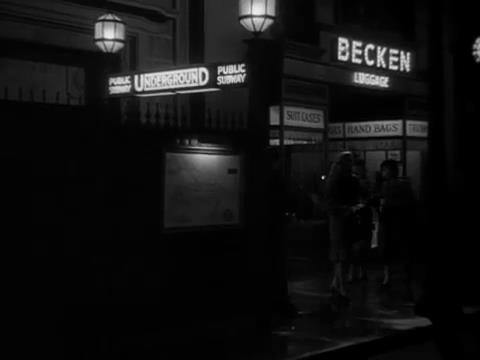Watch on the Rhine
“I fight
against Fascism, that is my trade.”
At the time of
filming, millions could say as much. Said in April, 1940, the words have a
different ring (the speaker is a veteran of the Spanish Civil War).
What Hitler does
in the morning is forgotten every evening by guests at the German embassy, a Wehrmacht officer observes, and the ambassador is a clod.
“Ribbentrop
did not send him here to amuse people.”
“Then
he’s doing very well.”
Dashiell Hammett
serves up Lillian Hellman’s play to a very fine, observant, well-studied
director who remembers the American desert reflected by the window of a train
in Wellman’s Thunder Birds the
year before, among many other things, and who works assiduously with his
actors, several of whom speak pseudo-English to avoid the necessity of
subtitles.
“Stirring
play,” said Bosley Crowther in his New York Times review,
“distinguished film,” he was stirred to his depths and perhaps
never wrote more distinguished prose.
The border
crossing exhibits Shumlin’s mastery, what the U.S. meant to a refugee is
expressed with the greatest skill imaginable and very briefly.
Variety
agreed, “a distinguished picture.”
The terrible
scenic depiction is truly difficult as a cinematic proposition,
the threads drawn together on the stage from so many interesting locales are
largely replaced by the one realization in Washington, D.C., that it can happen
here.
That being said, Crowther saw it another way, “the fundamental clash
in civilization is between those bent on self-aggrandizement and those who are
not”, to which an Englishman sizing things up might have said in reply,
“quite.”
The fundamental
accuracy of the portrayal is secondary to the dramatic action, remarkable as it
is. Certainly the times demanded it.
The
view from the Washington Monument.
“There’s
something insane about a Rumanian diplomat, pure insane.”
Opposition to
Nazism was bootless, at the time. “You understand what I mean, styles in wit change so.”
The
Fascist mystique. “What
wonderful work Fascists have done in convincing people they’re men from
legends... We don’t like to remember, do we,
they came in on the shoulders of some of the most powerful men in the world.
That makes us feel guilty, so we prefer to believe that they’re men from
the planets. Well, they aren’t. They’re smart, and they’re
sick, and they’re cruel, but,
given men who know what they fight for, and will fight hard...”
There is more to
say on this subject. “Please don’t describe me to myself
again...”
“There is a
deep sickness in the German character, a love of death, a love of
pain...”
“All
Fascists are not of one mind, one stripe. There are those who give the orders,
and there are those who take them, they came late. Some of them were, up to a
point, fastidious men, for these we may someday have pity. They are lost
men...”
Nazis are not to
be reasoned with. “Unlike you, I am not a gambler, I do not take
chances.”
Academy Award,
Paul Lukas.
“Yawn.”
(TV Guide)
According to Halliwell’s Film Guide, “it
made a prestige point or two for Hollywood.”
Confidential Agent

The man from the
Spanish Republic, by boat-train to London, pursued (cf. Lang’s Man Hunt).
What’s
England full of in October, 1937? Fox terriers elatedly and
Daddy’s money sulkily, over Scotch.
The artist and
his connoisseur on either side of the fence, punchy with the air raids and
Fascist thugs on one side, the rebarbative Government
the other.
Echoes are
throughout Pinter’s later work, culminating in Voices. It’s Daddy our man has come to see (cf. Asquith’s The Demi-Paradise), bringing the Civil War with him (“perhaps
I ought to wear a bell, like the old lepers”).
And from Graham
Greene, the journey across London to the Entrenationo
Language Centre (cf.
Preminger’s The Human Factor),
“I’ve arranged that your lesson—I hope I shall be able to
say, lessons?—will be given by one of your fellow countrymen—that
is always, if possible, our system, i-it induces
sympathy and, er, breaks the new... world order slowly, mmmmm?”
A
bullet in a back street. Shumlin’s dreamy camera movements here and there
describe curves around Bacall, whose performance, incredibly, was disprized.
“After they’d beaten you up last night, I was sick. Currie thought
it was the drink, but it was your face.” He is ten years ahead of the
time and more, there are distinct signs of an influence on De Sica in Umberto D. with the little maid of all
work (“I’ll be up at seven with yer
breakfast”) and the avaricious landlady at the “Strand
Palace”, the confrontation with Paxinou and
Lorre is remembered in Terence Young’s From Russia with Love, “The Very Thought of You” at the
roadhouse with Boyer and Bacall and Coulouris
(“here, you know, we get—well, I don’t mean to be snobbish,
but only the best people”) goes
into J. Lee Thompson’s CaboBlanco.
James Wong Howe,
Franz Waxman. The Hindoo peeper is from
Hitchcock’s The Lodger (Hitchcock
repays in Frenzy). “I’ve
been beaten, robbed, shot at, betrayed, I failed in my mission, I’ve had enough.” Question of coal from a year-old peer, for the lamps of Spain.
“I
don’t seem to be able to do anything
correctly.”
“Interesting
people one meets in your work.”
“You know,
there’s a passage in your Bible, ‘God hath chosen the foolish things
of the world, to confound the wise.’ I must tell Mr. Singh what you said,
a most profound remark.”
“The
righteous—voice—of the little—people—who wish to
inherit—the earth.”
“I’m
not sure it’s wise for England to do
business with that crowd.” The two detectives play a fine little trick on
The 39 Steps, Hitchcock repays ihe recurring couple in The
Man Who Knew Too Much.
Bosley
Crowther of the New
York Times, “generally engrossing melodrama”. Variety, “the story attempts to show how in 1937 the success of Franco adherents
was to become the prelude to an even greater conflict. The yarn’s
development is inept, and the link of the romance with the basic story is too
pat, at the expense of the major story line. ” Leonard Maltin,
“engrossing
spy yarn”.
Leonard Quart (Cineaste), “fails to capture the novel’s moral essence.” Tom Milne (Time Out), “striking, literate adaptation of Graham Greene's
novel.” TV Guide,
“a plodding film under Shumlin's unimaginative
direction... The dialog rings false in a pat story... There are some powerful
scenes in this film nonetheless... this contrived film... the murk and gloom of
a muddled story... an unsatisfying conclusion.” Halliwell’s Film Guide, “heavy-going simplification...
all at sea”, citing James Agee, “the best
attempt yet... to make the best of a Greene novel.”
